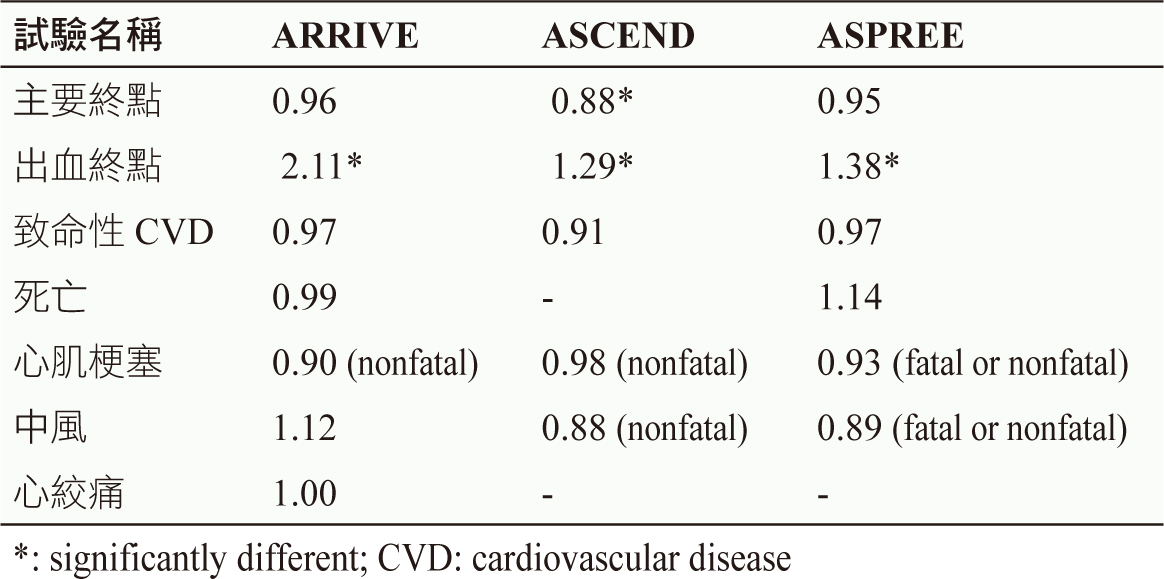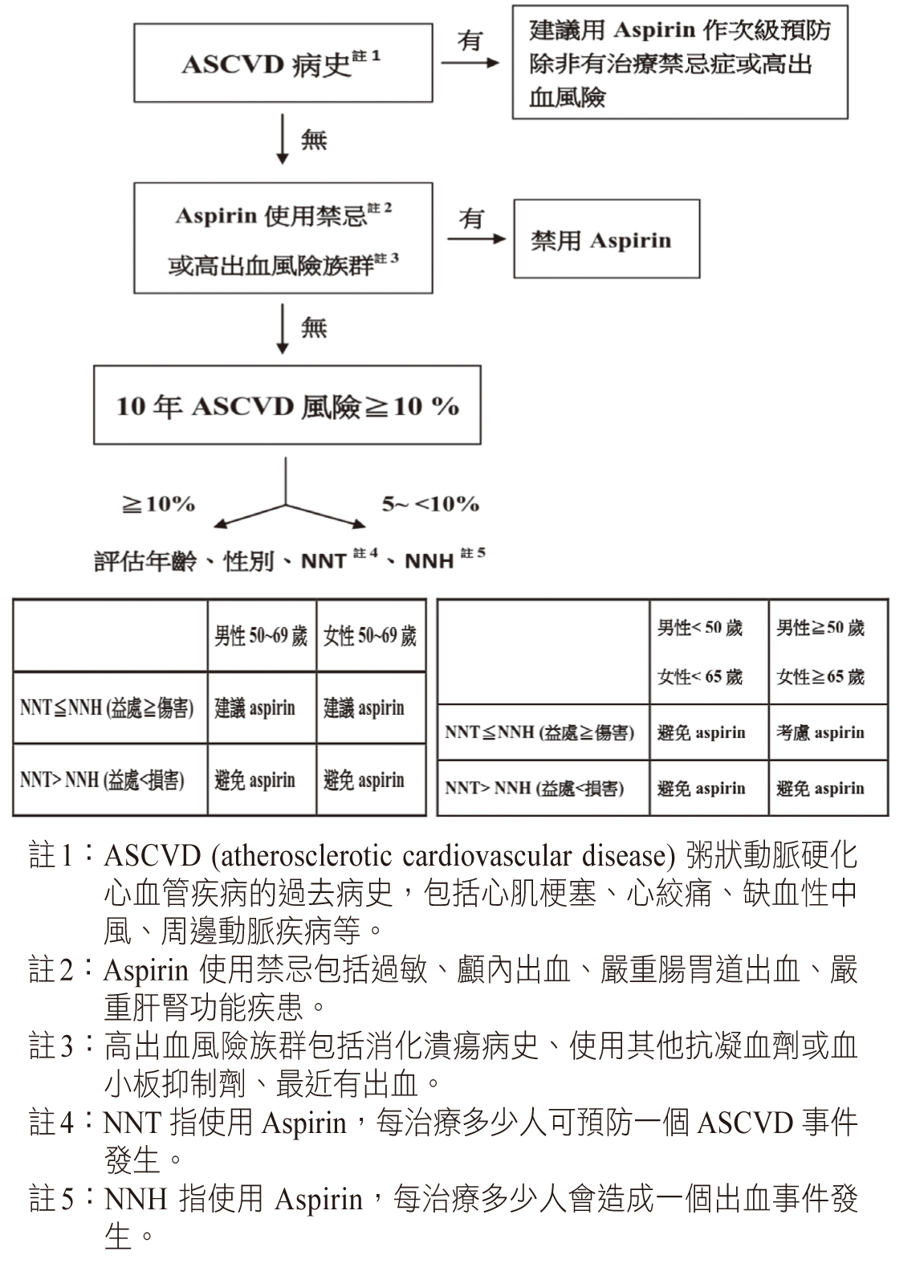Aspirin在心血管疾病初級預防的角色
高雄醫學大學附設中和紀念醫院藥學部藥師 蔡憶萱、楊璦瑜
摘要
Aspirin 已被證明,使用於曾發生心肌梗塞或中風的病人,可有效降低心血管疾病發病率和死亡率,強烈建議作為心血管疾病的次級預防藥物。然而,由於缺乏明確的益處,aspirin 不應常規作為心血管疾病的初級預防。臨床上是否使用 aspirin 作為心血管疾病的初級預防是一個複雜的過程,須個別化評估每個病人的益處與傷害風險。這個過程包括評估病人心血管疾病的發生風險、出血風險及是否願意長期治療的意願。因此使用 aspirin 作為心血管疾病的初級預防,不僅須評估治療的益處與風險,也須要與病人共享決策,制訂個別化的治療。
關鍵字:aspirin、cardiovascular disease、primary prevention
壹、前言
衛生福利部每年公布的十大死因中,心臟疾病與腦血管疾病在106年分居第二、四名。不只是台灣,心血管疾病 (cardiovascular disease;CVD) 在美國及全世界都是引起死亡的主要因素。CVD 最常見是缺血性的心肌梗塞 (myocardial infarction;MI) 和中風 (stroke)1。由於對死亡的影響,醫學界對 CVD 的初級和次級預防極為重視。初級預防 (primary prevention)是針對其致病因子和風險因子來預防初次 CVD 的發生;次級預防 (secondary prevention) 則是避免 CVD 再次發生。無論是初級或次級預防,都牽涉到需使用藥物來消除血栓形成的過程2。
抗血小板藥 aspirin 是目前臨床上使用相當廣泛的藥物,通過不可逆的抑制環氧合酶 (cyclooxygenase;COX),包括 COX-1和 COX-2,阻斷血栓素 (thromboxane A2;TXA2) 與前列腺素 (prostacyclin) 的生成來達到抗血小板凝集3,但同時會引起胃腸道方面的副作用。許多大型臨床試驗皆證實 aspirin 用於心血管疾病的次級預防上的益處,建議在10年內有 MI 和中風風險超過20%的患者服用75-100 mg aspirin 來預防 CVD 再次發生4。然而,對於先前無心血管疾病或尚無臨床症狀的族群,其初級預防的益處 (benefit) 與傷害 (harm) 間的平衡仍是具爭議性的。
2018年針對三個不同的族群,包括中度心血管疾病風險者 (use of Aspirin to Reduce Risk of Initial Vascular Events in patients at moderate risk of cardiovascular disease;ARRIVE)4、糖尿病病人 (A Study of Cardiovascular Events in Diabetes;ASCEND) 及健康高齡者 (Aspirin in Reducing Events in the Elderly;ASPREE) 進行 aspirin 作為初級預防的研究結果發表5,6。本文將論述臨床研究的結果與現行治療指引的建議,並運用以病人為中心的「醫病共享決策」,以提供醫療人員與病人共同進行最適當的醫療決策。
貳、Aspirin 對心血管的影響
探討 aspirin 使用於心血管疾病之初級預防的大型臨床試驗皆為隨機雙盲、安慰劑對照試驗。分別為 ARRIVE4、ASCEND5、ASPREE6。三個研究,收納的病人基本資料比較 (表一)4-6;其中 ASCEND 的受試者除試驗藥物外,試驗組每天補充1 g omega-3脂肪酸膠囊,對照組則給予安慰劑膠囊5。
表一 Aspirin 使用於心血管疾病之初級預防的病人基本資料比較表4-6
ARRIVE 的主要療效終點為首次發生 MI、中風、心血管死亡、不穩定型心絞痛或缺血性腦中風;安全性終點為出血及其他不良反應事件4。ASCEND 的主要療效終點為首次發生嚴重血管事件,例如:非致死性心肌梗塞、非致死性中風、缺血性腦中風、血管性死亡,排除已確診的顱內出血。安全性終點為任何大出血事件首次發生,例如:顱內出血、胃腸道出血、威脅視力的眼出血等5。ASPREE的主要試驗終點為死亡、失智 (dementia) 及失能 (persistent physical disability) 事件發生。次要終點包括主要出血事件和心血管疾病 (定義為致死性冠心病 fatal coronary heart disease,非致死性心肌梗塞,中風或因心衰竭住院)6。三個試驗的研究結果皆以風險比 (Hazard Ratio;HR)表示,比較內容 (表二)4-6。
表二 Aspirin 使用於心血管疾病之初級預防的主要研究結果4-6
療效終點,僅 ASCEND 研究顯示使用 aspirin 可顯著下降12%嚴重血管事件發生,ARRIVE 及 ASPREE 研究則與安慰劑間無差異。安全性部份,ASCEND 與 ASPREE 研究分別增加29%和38%的出血風險;ARRIVE 研究在輕度胃腸道出血增加2倍的風險,嚴重不良反應的發生率則相近4-6。
參、臨床治療指引的建議與醫病共享決策
國外使用 aspirin 作為心血管疾病預防藥物的相關治療指引 (表三),須依據病人年齡、心血管病史、糖尿病、出血風險、心血管風險等,進行個別化評估7-10。2016年 Brigham and Women's Hospital 和 Harvard Medical School 共同研發出一款「Aspirin Guide」的手機 APP 程式 (圖一)11,可以根據病人的個別化風險因子,計算出使用 aspirin 的益處 (benefit) 與傷害 (harm),藉由醫療團隊評估的結果與病人共同討論是否使用 aspirin 作為預防治療藥物,將醫病共享決策 (Shared Decision Making;SDM) 的概念實際執行的方法。
表三 國外使用 aspirin 作為預防心血管疾病的現行治療指引
圖一 Aspirin 用於 ASCVD 初級預防時的共享決策流程11
肆、結語
是否使用 aspirin 做為心血管疾病初級預防,應審慎評估每位病人個別化的心血管疾病與胃腸道出血的風險因子、能否接受長期治療的意願、偏好及成本等。Aspirin 最常見的不良反應是上消化道的副作用,若病人有消化道潰瘍病史、年齡 > 70歲、幽門螺旋桿菌感染、同時使用非類固醇抗發炎藥 (non-steroidal anti-inflammatory drugs) 或其他抗血小板藥物 (例如clopidogrel) 或抗凝血藥,會增加胃腸道出血的風險。
Hsu 等人的研究顯示,腸溶劑型 (enteric-coated) 或緩釋 (buffered) 無法降低治療的安全性12。Szabó 等人運用統合分析比較第二型組織胺受體拮抗劑 (histamine 2 receptor antagonists;H2RAs) 或氫離子幫浦抑制劑 (proton-pump inhibitors;PPIs) 在 aspirin 引起胃腸道出血的影響。結果顯示 H2RAs 組發生出血 (odds ratio = 2.102) 與潰瘍 (odds ratio = 2.257) 的風險較高,建議可優先選用 PPIs 作為預防藥物13。在以病人為中心、考量益處與傷害下,運用醫病共享決策,共同做出適當的臨床決定與擬定治療計畫,且確實執行以提升整體用藥安全及治療效果。
Aspirin in the Primary Prevention of Cardiovascular Disease
Yi-Hsuan Tsai, Ai-Yu Yang
Department of Pharmacy, Kaohsiung Medical University Hospital, Kaohsiung Medical University
Abstract
Aspirin has been shown to be effective in reducing cardiovascular morbidity and mortality in high-risk patients with previous myocardial infarction or stroke, It is strongly recommended for secondary prevention of cardiovascular disease. However, aspirin should be used infrequently in the routine primary prevention of cardiovascular disease because of lack of net benefit. Clinical decision making the appropriate use of aspirin for the primary prevention of cardiovascular disease is a complex process that requires assessment of the benefits and harms for each patient. The important of the process include evaluation of the patient’s risk of cardiovascular disease, the patient’s risk of bleeding, and the patient’s willingness to undergo long-term therapy. Therefore, the use of aspirin for primary prevention of cardiovascular disease not only assesses the benefits and risks of treatment, but also requires sharing decisions with patients and developing individualized treatments.
參考資料:
1. Hennekens CH, Schuttenberg N, Pfeffer MA: Prescription of Aspirin and Statins in Primary Prevention. Prim Care 2019;46(1):13-25.
2. Murphy S, McCarthy CP, McEvoy JW: Aspirin for the Primary Prevention of Cardiovascular Disease: Weighing Up the Evidence. Am J Med 2019. pii: S0002-9343(19)30220-7.
3. Leggio M, Bendini MG, Caldarone E, et al: Low-dose aspirin for primary prevention of cardiovascular events in patients with diabetes: Benefit or risk? Diabetes Metab 2018;44(3):217-225.
4. Gaziano JM, Brotons C, Coppolecchia R, et al: Use of aspirin to reduce risk of initial vascular events in patients at moderate risk of cardiovascular disease (ARRIVE): a randomised, double-blind, placebo-controlled trial. Lancet 2018;392(10152):1036-1046.
5. Bowman L, Mafham M, Wallendszus K, et al: Effects of Aspirin for Primary Prevention in Persons with Diabetes Mellitus. N Engl J Med 2018;379(16):1529-1539.
6. McNeil JJ, Wolfe R, Woods RL, et al: Effect of Aspirin on Cardiovascular Events and Bleeding in the Healthy Elderly. N Engl J Med 2018;379(16):1509-1518.
7. American Diabetes Association: 10. Cardiovascular Disease and Risk Management: Standards of Medical Care in Diabetes-2019. Diabetes Care 2019;42(Suppl 1):S103-S123.
8. Arnett DK, Blumenthal RS, Albert MA, et al: 2019 ACC/AHA Guideline on the Primary Prevention of Cardiovascular Disease. Circulation 2019:CIR0000000000000678.
9. Williams B, Mancia G, Spiering W, et al: 2018 ESC/ESH Guidelines for the management of arterial hypertension. Eur Heart J 2018;39(33):3021-3104.
10. Final Recommendation Statement: Aspirin Use to Prevent Cardiovascular Disease and Colorectal Cancer: Preventive Medication. U.S. Preventive Services Task Force. Available at: https://reurl.cc/ELkka Accessed May 26, 2019.
11. Aspirin-Guide app (http://www.aspiringuide.com/nav/1) Accessed May 26, 2019.
12. Hsu PI, Tsai TJ: Epidemiology of Upper Gastrointestinal Damage Associated with Low-Dose Aspirin. Curr Pharm Des 2015;21(35):5049-55.
13. Szabó IL, Mátics R, Hegyi P, et al: PPIs Prevent Aspirin-Induced Gastrointestinal Bleeding Better than H2RAs. A Systematic Review and Meta-analysis. J Gastrointestin Liver Dis 2017;26(4):395-402.
通訊作者:楊璦瑜/通訊地址:高雄市三民區自由一路100號
服務單位:高雄醫學大學附設中和紀念醫院藥學部藥師/聯絡電話:(O) 07-3121101 ext 7174





